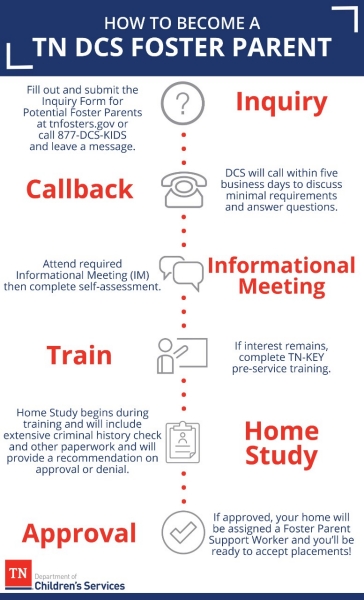To become a foster parent in Tennessee, you must meet the eligibility criteria and complete the required process. Becoming a foster parent in Tennessee involves meeting eligibility requirements and completing the necessary steps.
Foster parents in the state play a crucial role in providing a safe and nurturing environment for children who are unable to live with their biological families. The process includes attending an orientation, submitting an application, undergoing background checks and home inspections, completing training, and participating in interviews.
Additionally, prospective foster parents must be financially stable, have a stable living environment, and possess the ability to meet the needs of the children in their care. By becoming a foster parent, individuals in Tennessee have the opportunity to make a positive impact on the lives of children in need of a loving home.
Understanding Foster Care
Foster care in Tennessee can be an incredibly rewarding experience. Learn how to become a foster parent and make a difference in a child’s life today.
What is Foster Care?
Foster care is a crucial system that provides temporary care and support for children who are unable to stay with their biological parents. This arrangement allows children to live in a safe and nurturing environment until they can either be reunited with their birth families or find a permanent home through adoption.
The Role of a Foster Parent
Becoming a foster parent in Tn is a rewarding and life-changing commitment. As a foster parent, you play a vital role in providing stability, love, and care to children in need. Your primary goal is to offer a safe and nurturing environment where these children can thrive while their birth parents work towards resolving the issues that led to their removal from their homes.
Moreover, foster parents serve as advocates for the children in their care, ensuring their well-being and representing their best interests in court proceedings and other important decisions.
Benefits and Challenges of Foster Care
Foster care comes with its own set of benefits and challenges. Let’s take a look:
| Benefits of Foster Care | Challenges of Foster Care |
|---|---|
|
|
Becoming a foster parent requires a unique blend of compassion, resilience, and dedication. While it can be challenging at times, the rewards and positive impact you can make on a child’s life are immeasurable.
If you’re considering becoming a foster parent in Tn, taking the time to understand foster care, your role, and the benefits and challenges involved is key to making an informed decision.

Credit: www.powerschool.com
Requirements to Become a Foster Parent
Do you have a passion for helping children and providing them with a safe and loving home? Becoming a foster parent in Tennessee is a fulfilling and noble endeavor. But before you embark on this journey, it’s important to understand the requirements that need to be met. These requirements ensure that foster parents have the necessary qualifications, space, and support to provide a nurturing environment for children in need. Read on to learn more about the specific criteria you need to meet to become a foster parent in Tennessee.
Age and Legal Status
One of the primary requirements to become a foster parent in Tennessee is to be at least 21 years old. It’s essential to understand that age plays a significant role in ensuring that foster parents have the maturity and life experience necessary to provide proper care and guidance to the children under their care. Additionally, foster parents must have legal status in the United States and be able to provide documentation to verify their citizenship or immigration status.
Home and Space Requirements
The next set of requirements pertain to your home and the space available to accommodate a foster child. Tennessee mandates that foster parents have adequate space to provide each child with their own bed, closet or dresser, and personal space for privacy. This space requirement ensures that children have a sense of belonging and helps create a nurturing environment. It’s also essential that your home meets basic safety standards, including having working smoke detectors and fire extinguishers.
Background Checks and References
To ensure the safety and well-being of the children in foster care, Tennessee requires foster parents to undergo a thorough background check. This check includes criminal and child abuse registry checks to assess any potential risks to the children. Prospective foster parents must also provide references from non-relatives who can vouch for their character and ability to provide a stable and nurturing environment for children.
Health and Mental Health Assessments
Ensuring the physical and mental well-being of the children is of utmost importance. Foster parents in Tennessee are required to undergo a comprehensive health assessment that includes a physical examination and verification of up-to-date immunizations. Additionally, prospective foster parents must also undergo a mental health assessment to assess their ability to cope with the unique challenges of fostering and to provide adequate support to the children in their care.
Training and Education
Once you meet the aforementioned requirements, Tennessee requires all prospective foster parents to complete a pre-service training program. This training program equips foster parents with the skills and knowledge needed to meet the unique needs of foster children. It covers topics such as trauma-informed care, child development, managing challenging behaviors, and effective communication. Completion of this training program is necessary to ensure that foster parents are well-prepared to provide the best possible care to the children entrusted to them.
In conclusion, becoming a foster parent in Tennessee is a rewarding experience, but it comes with specific requirements that need to be met. These requirements include being at least 21 years old, having legal status in the United States, meeting home and space requirements, passing background checks, undergoing health and mental health assessments, and completing training and education programs. By meeting these requirements, you can take the first step towards becoming a loving and nurturing foster parent, making a positive difference in the lives of vulnerable children.
Application Process
In order to start the process of becoming a foster parent in Tennessee, the first step is to contact a foster care agency. These agencies provide support and guidance throughout the entire process. It is important to choose an agency that aligns with your values and objectives. Research different agencies in your local area and make a list of potential options to contact.
Once you have identified a few potential agencies, the next step is to reach out to them and make an initial inquiry. This can be done through a phone call or by filling out an online form on their website. During this initial contact, you will likely be invited to attend an information session where you can learn more about the foster care program and ask any questions you may have.
If you decide to move forward after the information session, you will need to complete an application to become a foster parent. This application process involves gathering necessary documents and providing personal information. The application typically includes questions about your background, family, experience, and living situation. It is important to be honest and thorough when completing the application to ensure a smooth process.
Once your application has been submitted and reviewed, the next step is the home study process. This involves an in-depth interview with a social worker who will visit your home to assess your suitability as a foster parent. During the home study, the social worker will evaluate your living environment, discuss your motivation to become a foster parent, and ensure that you meet all the necessary requirements.
The home study process may also include background checks, reference checks, and training sessions. It is important to be open and transparent during this process and to ask any questions you may have. The home study process helps to ensure that foster parents are equipped to provide a safe and nurturing environment for children in need.
By following these steps and actively engaging with the application process, you can become a foster parent in Tennessee and make a positive impact on the lives of children in need.

Credit: www.tn.gov
Licensing and Approval
To become a foster parent in Tennessee, you need to go through the licensing and approval process. This involves completing a comprehensive application, attending training sessions, and undergoing a thorough home study evaluation. Once approved, you will be able to provide a safe and nurturing environment for children in need.
Home Inspection
Becoming a foster parent in Tennessee involves a thorough home inspection as part of the licensing and approval process. The home inspection ensures that the living environment is safe and suitable for a child or children to reside in. During the inspection, a licensing worker will assess the overall cleanliness and organization of the home, ensuring that it meets specific safety standards. This may include checking that all electrical outlets are covered, smoke detectors are installed and working properly, and hazardous materials are stored safely out of reach. It’s important to prepare your home for the inspection by tidying up, organizing, and addressing any potential safety concerns well in advance.
Interviews and Assessments
Aspiring foster parents in Tennessee are required to undergo interviews and assessments to determine their suitability for the role. These interviews may be conducted individually or as a couple, and will typically involve questions about your background, motivation for becoming a foster parent, and previous experience with children. The purpose of these interviews and assessments is to evaluate your strengths, any potential challenges you may face, and your ability to provide a safe and nurturing environment for the children in your care. It’s essential to approach these interviews with honesty and openness, as transparency is valued throughout the licensure process.
References and Recommendations
During the process of becoming a foster parent in Tennessee, you will be required to provide references and recommendations from individuals who can provide insight into your character, parenting abilities, and overall suitability for this role. These references may include former employers, teachers, or mentors who can speak to your personal qualities, reliability, and ability to care for children. It’s essential to choose individuals who know you well and can provide an accurate assessment of your abilities. This step in the licensure process helps to ensure that foster parents are truly dedicated and committed to the well-being of the children in their care.
Once you have completed the home inspection, interviews, assessments, and provided the necessary references and recommendations, your application for becoming a foster parent in Tennessee will be evaluated for approval and licensing. The approval process typically involves a comprehensive review of all the information gathered throughout the licensure process. This includes assessing your ability to meet the physical, emotional, and developmental needs of a child or children in foster care. If your application is approved, you will receive your foster care license, allowing you to open your heart and home to children in need.
Matching with a Foster Child
Foster parenting can be a rewarding experience that makes a lasting impact on a child’s life. Once you have completed the required training and the home study process, the next step is to find a foster child who is the best match for your family. This matching process involves understanding foster child profiles, assessing compatibility, and facilitating a smooth placement and transition for the child.
Foster Child Profiles
Foster Child Profiles: Every foster child has a unique background and set of needs. Foster child profiles provide essential information about the child’s age, gender, interests, and any specific challenges they may be facing. These profiles help potential foster parents get a glimpse into the child’s personality and determine if they can provide the necessary support and care.
Assessment and Compatibility
Assessment and Compatibility: Once you express interest in a particular foster child, a thorough assessment is conducted to ensure compatibility between your family and the child. This assessment considers factors such as your family dynamics, living situation, and ability to meet the child’s specific needs. It is crucial to create a stable and nurturing environment that aligns with the child’s requirements.
Placement and Transition
Placement and Transition: Once the assessment is complete, the placement process begins. During this phase, careful consideration is given to finding the right match based on the child’s and the family’s needs. The foster care agency, in collaboration with the foster family, facilitates the child’s transition to their new home. Successful placement and transition involve open communication, support, and guidance to help the child adapt to their new surroundings smoothly.

Credit: www.flexjobs.com
Support and Resources
Becoming a foster parent is a rewarding and life-changing experience. While it can have its challenges, there are a variety of support and resources available to help you navigate this journey. From training and education to financial assistance, emotional and practical support to building a support network, these resources are designed to ensure that you have the tools and guidance you need to provide a loving and stable environment for the children in your care.
Training and Education
Training and education are essential components of becoming a foster parent in Tennessee. These programs equip you with the knowledge and skills needed to confidently care for children who may have experienced trauma or other difficult circumstances. Through comprehensive training, you will learn about child development, effective discipline techniques, and strategies for supporting the emotional well-being of children in foster care.
Financial Assistance
Financial assistance is available to foster parents in Tennessee to help offset the costs associated with providing for the needs of foster children. This includes a monthly stipend to cover expenses such as food, clothing, and basic necessities. Additionally, foster parents may be eligible for medical assistance and reimbursement for other related expenses. This financial support is invaluable in ensuring that foster parents can provide the best possible care for the children in their home.
Emotional and Practical Support
Emotional and practical support is crucial for foster parents, as the journey can be emotionally challenging at times. Tennessee offers a range of resources to provide support, including access to support groups, counseling services, and mentoring programs. These avenues can help foster parents navigate the unique experiences and emotions that come with caring for children in the foster care system. Additionally, practical support, such as respite care, is available to offer temporary relief for foster parents when needed.
Building a Support Network
Building a support network is essential for foster parents in Tennessee. This can involve connecting with other foster parents, professionals in the child welfare system, and community resources. By building this network, you can share experiences, gain insight and advice, and access additional resources when needed. Whether it is through online communities, local support groups, or organized events, fostering connections with others who understand your journey can be a valuable source of support and encouragement.
In conclusion, as a prospective foster parent in Tennessee, you can rest assured knowing that there are numerous support and resources available to assist you in providing a safe and nurturing environment for children in foster care. From training and education to financial assistance, emotional and practical support, and building a support network, these resources are designed to empower and equip you on every step of your foster care journey.Conclusion
Becoming a foster parent in Tennessee is a fulfilling and life-changing experience. By completing the necessary steps, attending training programs, and working alongside supportive agencies, you can open your heart and home to children in need. The process may seem daunting at first, but the rewards far outweigh the challenges.
So, if you’re ready to make a difference, take the leap and embark on this incredible journey of becoming a foster parent in Tennessee.




